Inflammation is the body's natural response to injuries and infections, aiding in the healing process. When this inflammation becomes chronic, it can lead to health issues such as heart disease, arthritis, and even some types of cancer. If you're passionate about your wellness journey and are looking to naturally reduce inflammation, this post is tailored to equip you with strategies that can make a meaningful impact.
How Does Inflammation Affect Your Body
Before we dive into the solution, let's understand the problem. Inflammation is the body's protective response to injury, allergens, or pathogens. It's critical for the body's healing process and helps fight foreign invaders. However, chronic inflammation is different's a long-term, low-grade response that can harm your cells and tissues, leading to serious diseases like obesity, depression, and even cancer. Understanding how to limit this chronic inflammation is important for long-term health.
How do you get Rid of Inflammation In Your Body?
Dietary Changes to Combat Inflammation
Choosing the Right Fuel for Your Body
Your diet plays a major role in maintaining healthy inflammation levels. Opting for a Mediterranean-style diet, rich in olive oil, fruits, vegetables, nuts, and fatty fish, may provide anti-inflammatory properties, while reducing the consumption of processed foods, refined sugars, and trans fats which are known to promote inflammation.
The Power of Antioxidants
Incorporating foods rich in antioxidants like berries, tomatoes, and dark leafy greens can help the body fight oxidative stress, a major contributor to chronic inflammation. These foods not only taste great, but also work wonders for your body on a cellular level.
Omega-3 Fatty Acids: Nature's Anti-Inflammatory
Foods such as salmon, sardines, and flaxseeds are packed with omega-3s, which can reduce levels of inflammation in the body. It's important to strike a balance between omega-3 and omega-6 fatty acids, as the latter can contribute to inflammation when overconsumed.
Exercise and Relaxation for an Inflammation-Free Life
Move Smart, Move Often
Regular physical activity not only helps you stay in shape but also has anti-inflammatory effects. Engaging in activities you enjoy, whether it's hiking, yoga, or simply taking a walk, can significantly reduce inflammation.
Stress: The Silent Protagonist of Inflammation
Chronic stress triggers an immune response, leading to inflammation. Managing stress through practices like meditation, deep breathing, or spending time in nature can help keep inflammation at bay.
The Importance of Quality Sleep
Inadequate sleep can increase the body's production of pro-inflammatory agents, leading to systemic inflammation. Prioritizing 7-9 hours of quality sleep each night is crucial for an inflammation-free lifestyle.
Natural Remedies
Turmeric: The Golden Spice
Curcumin, the active ingredient in turmeric, is a potent anti-inflammatory compound. Adding this golden spice to your meals or taking it as a supplement can contribute to reducing chronic inflammation.
Herbal Teas for Calm and Comfort
Chamomile, ginger, and green tea all possess anti-inflammatory properties. Sipping on these herbal infusions can be a soothing way to manage inflammation and incorporate more hydration into your daily routine.
Hot and Cold Therapy: Ancient Remedies for Modern Aches
Applying heat to an inflamed area can increase blood flow and relax muscles, aiding in the healing process. Conversely, cold therapy can reduce swelling and numb pain, offering relief from inflammation-induced discomfort. Alternate between hot and cold treatments for optimal results.
Maximizing the Benefits of Thermal Therapy
Hot and cold therapy, often recommended by healthcare professionals, is a leading self-care technique and may aid in managing localized inflammation. Heat therapy dilates blood vessels, enhancing circulation and nutrient delivery to areas of injury or chronic inflammation, which can accelerate healing. It also may help to reduce joint stiffness and muscle spasms, making it an excellent choice for those suffering from arthritis or muscle strains.
On the other hand, cold therapy constricts blood vessels, reducing blood flow and swelling, and is particularly effective immediately following an injury or for acute pain. When used together,these therapies can provide a comprehensive approach: heat to facilitate long-term healing and relaxation, and cold to alleviate acute symptoms by numbing pain and reducing swelling.
For Maximum health benefits, it's important to know when and how to apply each treatment safely and effectively. Always consult with your healthcare provider to know what's best for you.
Practical Tips for Implementing Thermal Therapy
To effectively use hot and cold therapy to reduce inflammation, it's essential to apply the appropriate therapy at the right time. For heat therapy, use a hot water bottle, a heated gel or silica pack, or a warm damp towel. Apply the source of heat for about 15-20 minutes at a time to the affected area, ensuring it's not too hot. This method is best for chronic stiffness or to relax tight muscles.
For cold therapy, a chilled gel pack can serve your purpose. Wrap the cold source in a cloth to protect your skin and apply it for short periods, around 15-20 minutes. Cold is most beneficial for acute injuries or flare-ups, where inflammation and swelling are prominent.
Always allow time between sessions for your skin to return to normal temperature and check your skin frequently to avoid thermal injuries. For ongoing issues or persistent pain, consult with a healthcare professional before initiating any self-therapy to ensure it is safe for your specific health condition.
The Bottom Line
Inflammation is a natural response to injury, but chronic inflammation can potentially lead to serious health issues. By incorporating dietary changes, regular exercise and relaxation practices, as well as natural remedies, you can effectively manage inflammation and promote overall wellness. Remember to listen to your body and consult with a healthcare professional for personalized advice.
Stay healthy, stay happy!



